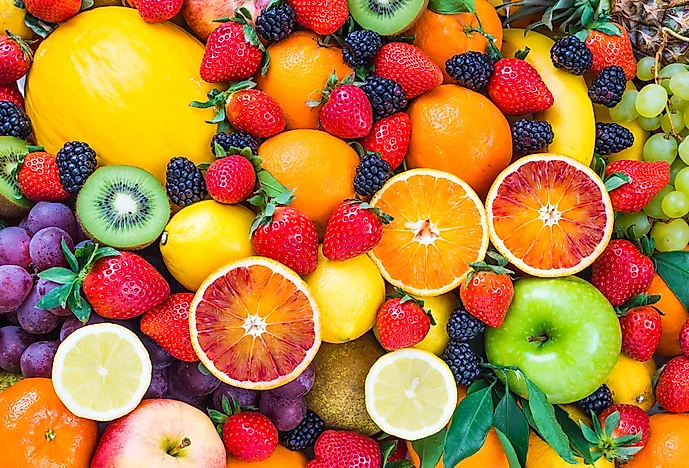Education
(Click me)
(Click me)
(Click me)
Exercise is extremely important in order to maintain a healthy lifestyle!
For example, exercise has been shown to relieve stress and improve your mood. Your mood can benefitno matter how intense the exercise! Not only that, but exercise can increase your energy levels. Cardiovascular exercise in particular creates new brain cells, improving your brain performance! In addition, exercise builds strong muscles and bones, which are really important. When you're younger, it helps build high bone density, which could help prevent diseases like osteoporosis when you get older. More importantly, regularly exercising can decrease your risk of having diabetes and heart disease.

Fruits are good sources of potassium, dietary fiber, vitamin C, and folate (folic acid). A diet with a lot of fruit can reduce the risk of heart disease, protect against certain types of cancer, help lower blood pressure and decrease bone loss.
Eating whole fruit is better than drinking fruit juice because whole fruits contain fiber, which helps reduce blood cholesterol levels and may lower risk of heart disease and is important for proper bowel function. Juices often do not have the fiber from the pulp. Eating fruit in general is especially important because they contain folate, a vitamin that is needed by cells for growth.

Vegetables are a good source of potassium, dietary fiber, folate (folic acid), vitamin A, and vitamin C. The five categories of vegetables are dark-green vegetables, starchy vegetables, red and orange vegetables, beans and peas, and other vegetables. Dark-green vegetables include foods like spinach and broccoli. Your rabbit's favorite food - carrots! - is in the category of red and orange vegetables. There are a lot of different kinds of beans and peas that you can eat to have a healthy diet, such as pinto beans or lentils. The mashed potatoes you eat at Thanksgiving fall under the category of starchy vegetable. Other delicious and healthy vegetables include mushrooms, onions, and cucumbers.

Grains are made from wheat, rice, oats, cornmeal, or barley. For example, bread, cereal, oatmeal, and pasta are all considered grains.
There are two kinds of grains: whole grains and refined grains. Whole grains have the whole grain kernel, including the bran and the germ. Oatmeal and brown rice are two kinds of whole grains. White rice is an example of a refined grain. They have been processed and do not have the bran and the germ. The bran and the germ contain many beneficial minerals such as fiber and vitamn B. Because they don't have the bran and the germ, refined grains are often finer and have a longer shelf life. Some are enriched with iron and vitamin B, so you should check to see if your refined grains are enriched. However, half of all the grains you eat should be whole grains in order to have a healthy diet because enriched refined grains do not contain fiber. And as you already know from the fruits section, fiber is VERY important.

The protein group contains meat, poultry, seafood, eggs, processed soy products, nuts, and seeds. Beans and peas are part of both the protein group and the vegetable group. They are a good source of B vitamins (niacin, thiamin, riboflavin, and B6), vitamin E, iron, zinc, and magnesium. Seafood in particular contains healthy omega-3 fatty acids (such as EPA and DHA) and also helps to prevent heart disease. Nuts like walnuts and pistachios can also help to reduce the risk of heart disease. Proteins function as building blocks for bones, muscles, cartilage, skin, and blood, which are all really important parts of your body!
The magnesium in proteins help build bones and release energy from muscles. Iron is used to carry oxygen in the blood. B vitamins found in proteins help the body release energy, form red blood cells, and build tissues.

Special Information for Vegetarians
Vegetarians can eat eggs, beans and peas, nuts, nut butters, and soy products in order to get enough protein. Since protein supplies iron, it is important that vegetarians get enough of it. Vegetarian iron sources include spinach, kidney beans, black-eyed peas, and lentils. As well, vitamin B12 is found only in animal products, so vegetarians should make sure to get enough of it from milk products and eggs. Otherwise, they may need to take a supplement.

The dairy group is made up of foods made from milk that contain calcium. Foods made from milk that have little to no calcium, such as cream cheese, cream, and butter, are not part of the group. Calcium-fortified soymilk is part of the dairy group. Dairy products also often contain potassium, vitamin D, and protein. Potassium can help you retain a healthy blood pressure while vitamin D helps to maintain proper levels of calcium and phosphorous. Consuming dairy products is important for bone health, especially for kids. Consuming dairy products can also reduce the risk of cardiovascular disease and type 2 diabetes.

Special Information for Lactose Intolerant People
Lactose intolerant people are able to consume lactose-free products (such as Lactaid) as well as calcium fortified milk substitutes (soy milk, almond milk, etc.). Other ways for those who don't consume dairy products to get enough calcium are by eating canned fish (sardines, salmon with bones), certain types of beans, and some types of leafy greens (collard and turnip greens, kale, bok choy).
Did you know?
Americans ingest 160 pounds of sugar a year, on average.
Did you know?
Trans fats are associated with a higher risk of heart disease and obesity.
Did you know?
High levels of sodium can cause high blood pressure.
Did you know?
Eating more nuts can cut your risk of getting a stroke in half.



